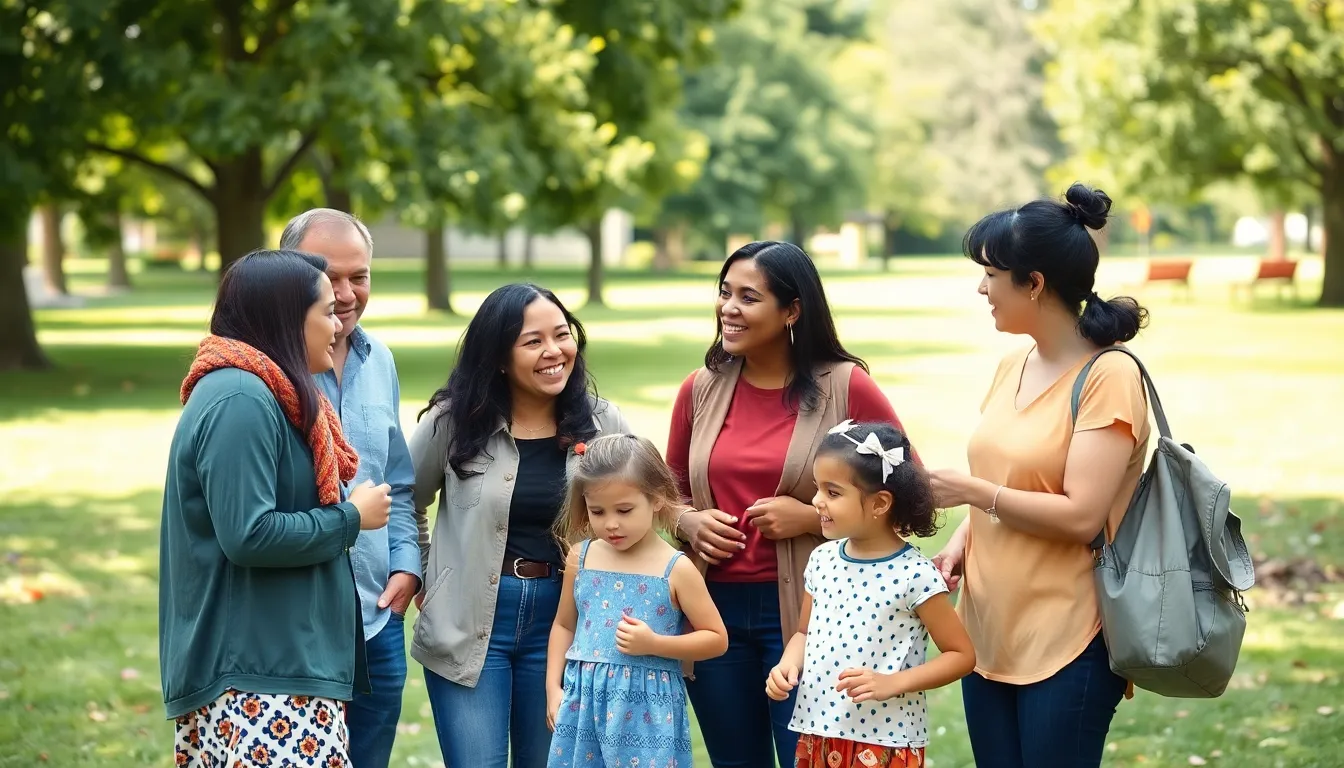In the wild world of parenting, it often feels like a chaotic circus where the clowns are your kids and the ringmaster is a sleep-deprived version of yourself. Navigating the ups and downs of raising little humans can be overwhelming, but luckily, there’s a vibrant parenting community ready to catch you when you stumble. Whether you’re seeking advice on toddler tantrums or just need a laugh about the latest parenting fails, this community is your lifeline.
Joining a parenting community isn’t just about sharing tips; it’s about finding your tribe. It’s a place where parents can swap stories, vent frustrations, and celebrate victories—big or small. So grab your coffee (or wine, we won’t judge) and dive into a world where every parent knows that, behind the chaos, there’s a beautiful adventure waiting to unfold.
Table of Contents
ToggleOverview of Parenting Communities
Parenting communities serve as vital support networks for caregivers. These groups foster connections among parents, providing a safe space to share experiences. Members often exchange practical advice on various parenting challenges, ranging from sleepless nights to teen issues.
Support can take many forms, including online forums, local meet-ups, and social media groups. Online platforms like Facebook and Reddit host numerous parenting communities, allowing instant access to a diverse range of perspectives. Local organizations often sponsor parenting workshops, which foster community involvement and education.
Community engagement enhances emotional well-being. Many parents find comfort in understanding that others face similar struggles. Regular participation in discussions can alleviate feelings of isolation. Sharing success stories also serves to motivate and uplift group members.
Research indicates that active involvement in a parenting community boosts confidence. Parents gain insights into effective parenting techniques through shared experiences. They can learn about new resources, from educational materials to childcare options.
Furthermore, opportunities for collaboration often emerge within these groups. Some communities organize playdates, scheduled outings, or communal parenting events. Collaborative efforts create enriching environments for children and strengthen adult relationships.
Each community possesses unique characteristics tailored to specific needs. Some focus on single parents while others cater to parents of children with special needs. Access to tailored support systems allows parents to find a community that resonates best with their circumstances.
Benefits of Joining a Parenting Community

Joining a parenting community offers numerous advantages that enhance the parenting experience. One major benefit involves gaining emotional support during challenging times.
Emotional Support
Emotional support serves as a cornerstone of parenting communities. Parents find solace in sharing their struggles and triumphs, fostering a strong sense of camaraderie. This support can alleviate feelings of isolation, making tough days more manageable. Additionally, hearing others’ stories provides perspective, reminding members they’re not alone in their journey. As parents vent frustrations, they receive understanding responses, which can be profoundly comforting. Studies show that engaged parents in community settings report higher levels of emotional well-being, thanks in part to these supportive interactions. Consequently, the connections formed within these communities build resilience and confidence in their parenting abilities.
Sharing Resources
Sharing resources enhances the effectiveness of parenting communities. Parents exchange practical advice on childcare techniques, educational tools, and product recommendations. This exchange cultivates a wealth of knowledge, helping families navigate various challenges more effectively. Local meet-ups often facilitate sharing experiences firsthand, while online forums allow for quick access to diverse insights. Parents save time and money by tapping into shared resources, such as babysitters or local events. Furthermore, engaging with experts within the community can yield valuable advice on child development and health. Ultimately, resource-sharing empowers parents, equipping them with tools needed to raise happy, well-adjusted children.
Types of Parenting Communities
Parenting communities can take various forms, each providing unique avenues for support and connection.
Online Platforms
Online platforms foster connections among parents through social media groups and forums. These spaces allow members to share experiences and advice at any time. Interaction remains constant, with discussions ranging from daily tips to emotional support. Popular platforms include Facebook groups, Reddit forums, and specialized parenting websites. Accessibility becomes a key benefit, as parents can engage from home, fitting conversations around busy schedules. Many groups offer resources, such as expert articles and webinars, enhancing knowledge on specific issues. Members often find camaraderie and build relationships, leading to lasting friendships that extend beyond the digital realm.
Local Support Groups
Local support groups create face-to-face connections, encouraging parents to meet in community centers or parks. These gatherings often feature structured activities, such as parenting classes or playdates, allowing children to socialize. Members benefit from sharing insights and experiences during casual meet-ups. Geographic proximity makes participation convenient, enabling ongoing interaction and support. Many groups are organized by specific demographics, such as new parents, single parents, or parents of children with special needs. This targeting nurtures a sense of belonging, as participants relate to similar challenges and triumphs. Support networks formed here can transform parenting journeys, bringing encouragement during both tough and joyful times.
How to Choose the Right Parenting Community
Choosing the right parenting community involves understanding specific needs and preferences. Finding a supportive environment can significantly enhance the parenting experience.
Assessing Your Needs
Identify personal priorities to align with community offerings. Consider factors like parenting style, location, and preferred communication methods. Determine if the focus on specific age groups, challenges, or shared interests matters. For example, some parents might seek advice specific to toddlers, while others might need support for teenagers. Evaluate whether online connections suit your lifestyle or if in-person meet-ups present a better fit. Remember, a community that resonates with your unique parenting journey fosters deeper connections and enhances engagement.
Community Engagement
Engagement levels directly impact the effectiveness of a parenting community. Seek groups that promote active participation and encourage regular sharing of experiences. Look for forums or social media platforms that invite discussion and foster camaraderie. Local gatherings also play a crucial role; they often provide opportunities for meaningful interactions. Participate in events like workshops or playdates, which can solidify bonds and exchange practical insights. Frequent involvement can enhance emotional support, making challenges easier to navigate and joys more fulfilling. A well-engaged community inspires confidence and offers a strong network to rely on during parenting journeys.
Finding a supportive parenting community can transform the parenting experience. These networks not only provide vital emotional support but also foster connections that make the journey more enjoyable. Engaging with others allows parents to share valuable insights and learn from diverse perspectives.
Active participation in these communities can significantly boost confidence and resilience. By connecting with like-minded individuals, parents can navigate challenges more effectively and celebrate successes together. Ultimately, the right community can make all the difference, turning the chaotic adventure of parenting into a more fulfilling and enriching experience.




